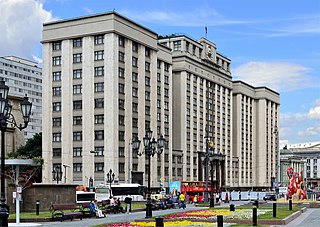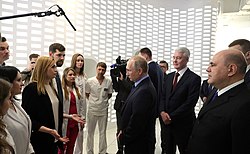
Vyacheslav Viktorovich Volodin is a Russian politician who currently serves as the 10th Chairman of the State Duma.

Alexander Valentinovich Novak is a Russian politician who is the current Deputy Prime Minister of Russia since November 2020.

Andrey Removich Belousov is a Russian economist and politician, serving as First Deputy Prime Minister since 21 January 2020. Previously, he was an Assistant to the President of Russia and Minister of Economic Development.

The public image of Vladimir Putin concerns the image of Vladimir Putin, President of Russia, among residents of Russia and worldwide.

The State Duma of the Federal Assembly of the Russian Federation of the 7th convocation is a former convocation of the lower house of Russian parliament.

Legislative elections were held in Russia from 17 to 19 September 2021. At stake were 450 seats in the 8th convocation of the State Duma, the lower house of the Federal Assembly. Going into the elections, United Russia was the ruling party after winning the 2016 elections with 343 of the 450 seats, and retaining a supermajority. In March 2020, it was proposed to hold a snap election in September 2020 due to proposed constitutional reforms, but this idea was abandoned. On 18 June 2021 Vladimir Putin signed a decree calling the election for 19 September the same year. Owing to the COVID-19 pandemic in Russia, voting in the election lasted for three days, from 17 to 19 September. Final turnout was reported to be 51.72%.

Vladimir Vladimirovich Yakushev is a Russian politician serving as the Presidential Plenipotentiary Representative in the Ural Federal District since 9 November 2020.
Events in the year 2020 in the Russian Federation.

Mikhail Vladimirovich Mishustin is a Russian politician and economist serving as the prime minister of Russia since 16 January 2020. He previously served as the director of the Federal Taxation Service from 2010 to 2020.

The Mikhail Mishustin Cabinet is the federal government of Russia, formed in 2020, led by Prime Minister Mikhail Mishustin. It succeeded the previous one led by Dmitry Medvedev.

The COVID-19 pandemic in Russia was a part of the ongoing pandemic of coronavirus disease 2019 caused by severe acute respiratory syndrome coronavirus 2.
Turkmenistan is the only remaining sovereign country in the world that has not reported any cases of COVID-19. There were no confirmed cases of COVID-19 in Turkmenistan, with the totalitarian government being proactive in censoring relevant information. It is however suspected to have spread in the country unreported; specifics are difficult to ascertain and confirm in absence of independent media.

The COVID-19 pandemic was confirmed to have reached Abkhazia in April 2020.

The government of Russia has initially responded to the COVID-19 pandemic in the country with preventive measures to curb the spread of the coronavirus disease 2019 in the country, which involved imposing quarantines, carrying raids on potential virus carriers, and using facial recognition to impose quarantine measures. Measures to prevent a crisis in Russia include banning the export of medical masks, random checks on the Moscow Metro, and cancellation of large-scale events by schools. The Russian government has also taken measures to prevent foreign citizens from heavily affected countries from visiting Russia. Local governments have also responded to the pandemic by imposing their own preventive measures in their communities.

This article is about the social impact of the COVID-19 pandemic in Russia.

The COVID-19 vaccination campaign in Russia is an ongoing mass immunization campaign against severe acute respiratory syndrome coronavirus 2 (SARS-CoV-2), the virus that causes coronavirus disease 2019 (COVID-19), in response to the ongoing pandemic in the country. Russia became the first country to begin a mass COVID-19 vaccination programme on 5 December 2020, starting with primarily doctors, medical workers and teachers. In January 2021, this was extended to the entire population.

The State Duma of the Federal Assembly of the Russian Federation of the 8th convocation is the current convocation of the lower house of Russian parliament.

Larisa Kuzhugetovna Shoigu was a Russian politician. She served as a Deputy of the State Duma for its 5th, 6th and 7th convocations, between 2007 and 2021.
















